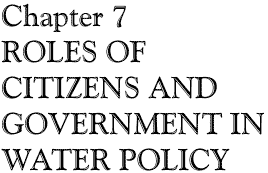
| ch. 7, pp. 108 - 109 |
Another option is to leave Tucson Water under city control, but have a private management company operate the facilities, rather than city employees. The City Council would continue to set policy, but would contract for services as it does with its public transit system. The benefits are that the council would be less involved in operational details, leaving that to outside professional management which would provide the services as contracted. Such a major transition, however, could create problems in water service, without necessarily improving it. Another option is for Pima County to become the regional water provider, at least for the water service area now served by Tucson Water, as it is now the primary regional wastewater provider. This would require a change in state law to enable the county to take on this new charge. The principal advantage would be the enfranchising of Tucson Water customers outside city limits. This has generally been considered politically infeasible as Tucson likely would be unwilling to give up this power. Still another option is one that was pursued for years by Tucson Water; i.e., establish Tucson Water as the only municipal water provider in the region. During the 1960s and 1970s, the city acquired numerous small water companies with the goal of providing unified water management both inside and outside city limits. Officials believed that one consolidated water system could better distribute water and costs fairly among customers, perform more effective water conservation programs and assure adequate water for fire protection in all areas. All companies were acquired through voluntary purchases. One drawback of this system is that it would serve a greater number of people who, because they live outside city limits, cannot vote on water matters that affect them. Because the voting public has such an important influence on water decision making, having the right to vote on water matters is important. Only Tucson city residents, however, may vote for City Council and mayor or cast ballots in water bond elections, water initiatives and referendums affecting Tucson Water. Many people who live outside city limits object to this disenfranchisement. Meanwhile city residents who do not receive water from the city have the right to vote on Tucson Water matters. If the city continues to be the major municipal water provider in the area, is there some way to enfranchise non-residents? Various bills to deal with this issue have been introduced in the Legislature. The most recent one would give ACC responsibility for approval of water rates for people outside city limits. Opponents point out that water rates could be very different inside and outside the city, with rates outside probably increasing to cover the cost of going through rate hearings. Current state law forbids a municipality from charging substantially more to customers outside its limits; modest rate differences must be based on higher costs to deliver the water. Most people would not consider it fair or legal for non-residents to vote for city officials since most decisions made by those officials are unrelated to water matters; e.g., decisions that impact city taxes and services. Should all water customers vote on water bond issues, since water bonds are repaid not by taxes but by water service revenues? Should they be able to vote on water initiatives and referenda? An argument can be made for these rights, but a change in state law probably would be required to enable a city to have an election outside city limits.
|
